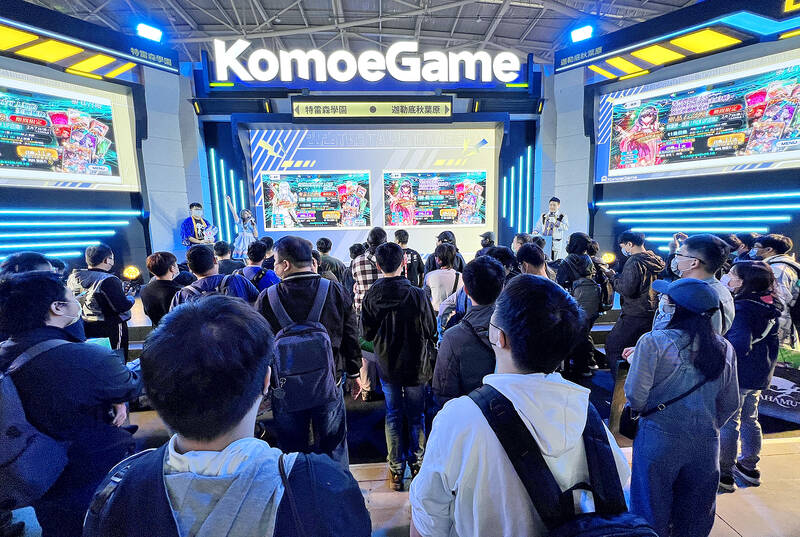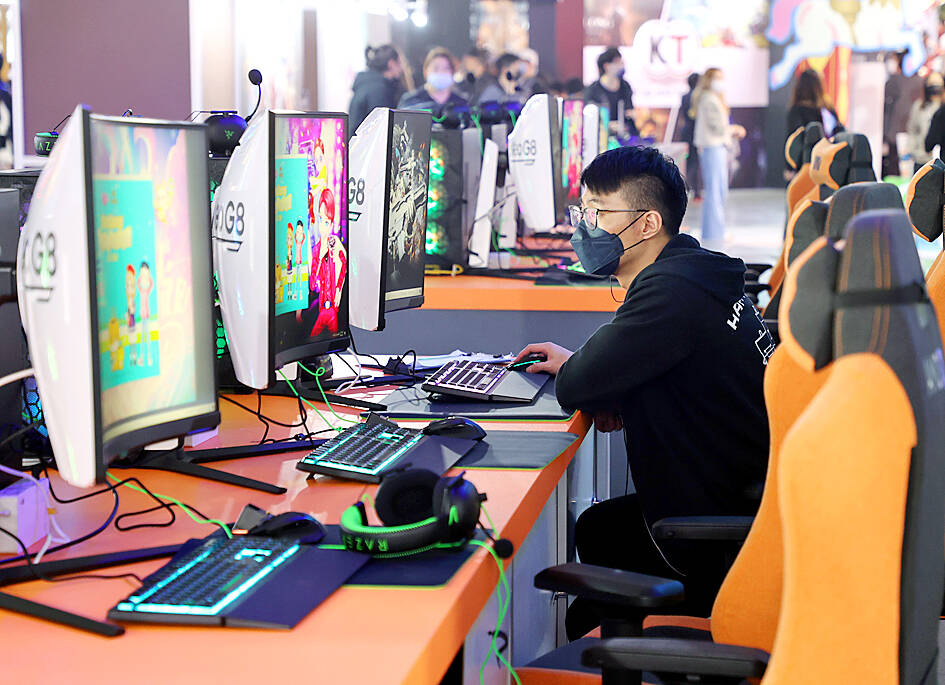The Taipei Game Show opened yesterday with large crowds of gaming enthusiasts visiting more than 1,000 booths featuring 275 vendors from 25 countries, while gaming companies from Asia expressed eagerness in forming partnerships with counterparts in Taiwan.
Gamers, cosplayers and businesspeople from the gaming industry took part in various activities at the 1,150 booths, which showcased new gaming products such as games and consoles, gaming peripherals and e-sports gear.
One of the major sections of the annual game show is the B2B Zone, where companies from countries such as Japan, South Korea, Singapore, Malaysia and the Philippines are looking to form partnerships with Taiwanese firms and clients.

Photo: CNA
The B2B Zone features game publishers, payment service providers, sound production service providers, cloud integration providers and other companies throughout the game industry chain.
Aleson Buenavista, studio manager of Philippine art, animation and game development company Definite Studios, said that he wanted to make connections with Taiwanese companies that can offer game localization, and collaborate on art and animation.
Definite Studios currently has five projects on which it is working with Taiwanese companies, Buenavista said.

Photo: CNA
“It is very nice to talk to Taiwanese people and [Taiwan] is very near to the Philippines, so if there is any need for us to travel and check in with our client, it is very easy for us to travel, because it is only one and a half hours away from the Philippines,” Buenavista said.
Another company, Ranida Games, is also at the B2B Zone promoting one of its action fighting games Vita Fighters in hopes of finding a partner to localize the game for the Taiwanese market.
Taiwan “has a very good fighting game community and has very good fighting game players. We would like to localize this, with traditional Chinese, so we can easily attract more players,” said Walter Manalo, head of the company’s business development.
The game has been downloaded about 200,000 times on mobile phone platforms in the Philippines and downloaded 800,000 times worldwide, Manalo said, adding that his company is looking for a company that can publish the game on a console such as PlayStation or Xbox.
Other games featured at the show include major names such as new action role-playing game Wo Long: Fallen Dynasty and the role-playing adventure Atelier Ryza 3: Alchemist of the End & the Secret Key.
The game show runs until Sunday at Taipei Nangang Exhibition Center’s Hall 1.

South Korea’s equity benchmark yesterday crossed a new milestone just a month after surpassing the once-unthinkable 5,000 mark as surging global memory demand powers the country’s biggest chipmakers. The KOSPI advanced as much as 2.6 percent to a record 6,123, with Samsung Electronics Co and SK Hynix Inc each gaining more than 2 percent. With the benchmark now up 45 percent this year, South Korea’s stock market capitalization has also moved past France’s, following last month’s overtaking of Germany’s. Long overlooked by foreign funds, despite being undervalued, South Korean stocks have now emerged as clear winners in the global market. The so-called “artificial intelligence

NEW IDENTITY: Known for its software, India has expanded into hardware, with its semiconductor industry growing from US$38bn in 2023 to US$45bn to US$50bn India on Saturday inaugurated its first semiconductor assembly and test facility, a milestone in the government’s push to reduce dependence on foreign chipmakers and stake a claim in a sector dominated by China. Indian Prime Minister Narendra Modi opened US firm Micron Technology Inc’s semiconductor assembly, test and packaging unit in his home state of Gujarat, hailing the “dawn of a new era” for India’s technology ambitions. “When young Indians look back in the future, they will see this decade as the turning point in our tech future,” Modi told the event, which was broadcast on his YouTube channel. The plant would convert

‘SEISMIC SHIFT’: The researcher forecast there would be about 1.1 billion mobile shipments this year, down from 1.26 billion the prior year and erasing years of gains The global smartphone market is expected to contract 12.9 percent this year due to the unprecedented memorychip shortage, marking “a crisis like no other,” researcher International Data Corp (IDC) said. The new forecast, a dramatic revision down from earlier estimates, gives the latest accounting of the ongoing memory crunch that is affecting every corner of the electronics industry. The demand for advanced memory to power artificial intelligence (AI) tasks has drained global supply until well into next year and jeopardizes the business model of many smartphone makers. IDC forecast about 1.1 billion mobile shipments this year, down from 1.26 billion the prior

People stand in a Pokemon store in Tokyo on Thursday. One of the world highest-grossing franchises is celebrated its 30th anniversary yesterday.